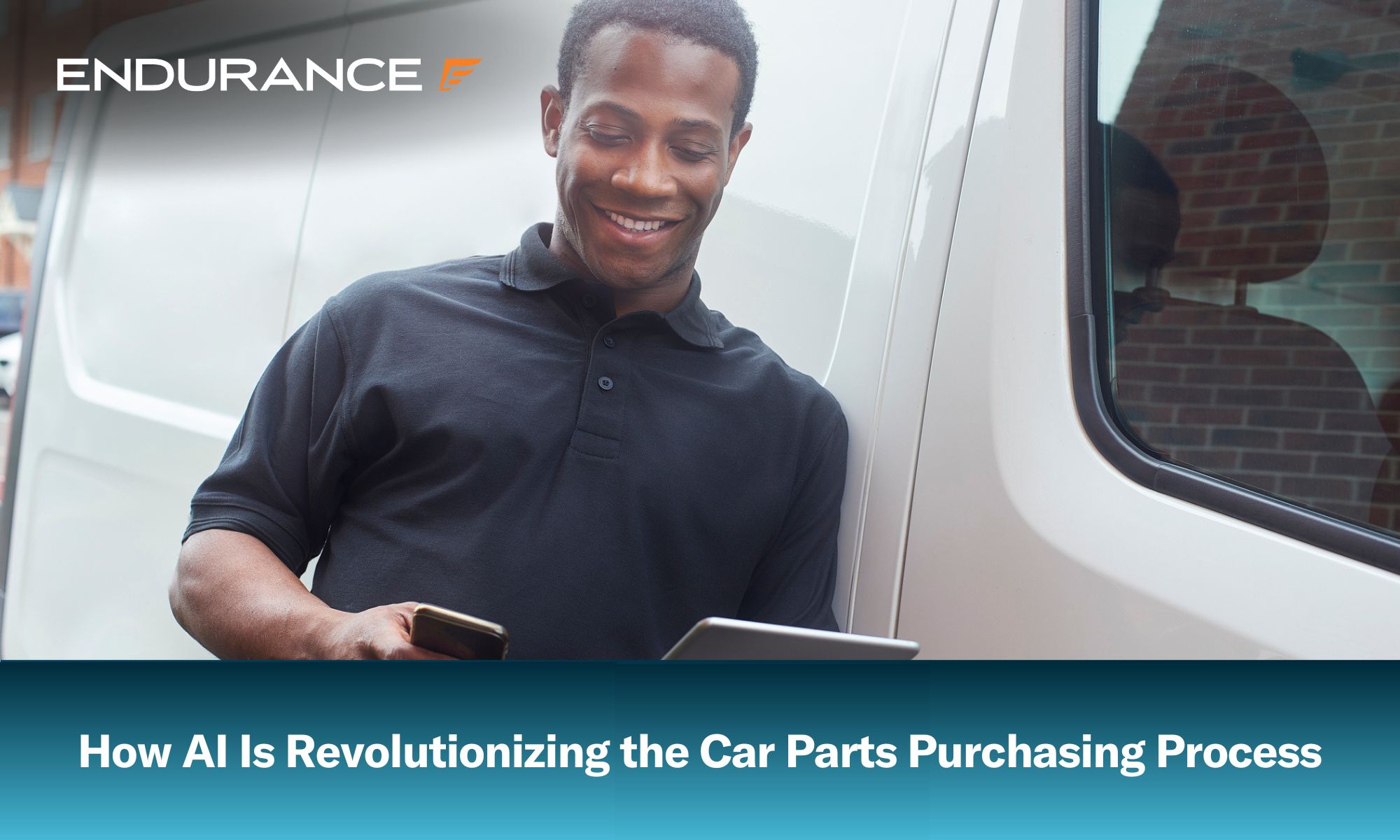How AI Is Revolutionizing the Car Parts Purchasing Process

If your idea of buying car parts involves heading to the local auto supply store or ordering online, prepare for a different future. Like many industries, the car parts business is being transformed by artificial intelligence (AI) and machine learning.
While where you buy vehicle components may not change, how you buy them certainly will. AI technology will change how auto supply companies stock and price their goods, and consumers will get alerts about parts needing replacing before there’s a breakdown. At the same time, optimized car parts inventories may make life easier for sellers and buyers.
The implications of these advancements are significant due to the size of the auto parts marketplace. According to a report by Market Research Future, the car parts sector will grow to $755 billion by 2026. Car owners are looking to keep their vehicles on the road longer, a byproduct of increased automobile values over recent years. In other words, some consumers would rather keep their car than shop for a new one at inflated prices.
Today’s car parts industry relies heavily on complex distribution networks and a patchwork of retail outlets to meet the demands of consumers and repair shops. Thanks to computers, the business has come a long way from the phone calls and printed catalogs of the 20th century. However, factors like inventory management, demand forecasting, pricing strategies, and timely delivery remain challenging for retailers in a highly competitive arena.
This is where AI will be a game changer by helping buyers find the right part at the right time and the right price. Consumers can be assured of getting components that are compatible with their specific car models and won’t have to suffer long waits.
More so, this technology will help businesses accurately forecast needs, maximize inventory, and streamline sales and delivery tasks. Advanced algorithms will sort through past sales, consumer behavior, car models, technical specifications, and market trends to predict demand, making things simpler.
This may all come across as big talk, but the future is coming, and the benefits of AI are growing quickly. Let’s break down what artificial intelligence really means for the car parts or the automotive industry.
Predictive Maintenance: Anticipating Repairs Before They Happen
While not everyone may want to know the future, it can be very helpful when it comes to your car. Predictive maintenance examines repair histories, telemetry data, and usage patterns to predict the wear and tear on car components. For instance, AI algorithms assess odometer readings, fuel consumption patterns, engine oil temperature, and other critical metrics. Based on what’s learned, a predictive maintenance system then forecasts problems like uneven tire wear, a faulty battery, or a troubled alternator before trouble arises. Not only does this minimize vehicle downtime, but this approach leads to safer driving.
AI can analyze driving patterns more likely to lead to quicker brake degradation. The system can not only recommend a change in driving behavior but also suggest a preventative service check-up, potentially saving the owner the cost of a more expensive repair later.
Predictive maintenance also helps auto parts retailers and dealers. By identifying repair trends, businesses can anticipate demand and optimize inventory and staffing levels.
Automated Inventory Management: Precision in Stock-Keeping
Managing inventory effectively can be challenging for companies with thousands of specialized car parts. Overstock ties up working capital, leading to shortages and lost sales. AI-based inventory control puts this in the past as the system autonomously handles forecasting and reordering. Pre-set inventory minimums, when reached, can trigger automatic ordering, minimizing stock-outs.
This technology looks at sales history, customer demographics, seasonal or event-driven demand spikes, competitor pricing, and real-time product availability so the necessary parts can be on hand (in the correct quantities) when needed.
Further, AI technology can vastly improve how companies organize their inventory. Digital tracking improves space utilization, lowers costs, uses staffing better, and enhances order fulfillment. The average consumer doesn’t care how car parts are stored in a warehouse, but these changes can lead to getting parts faster and cheaper.
Virtual Parts Advisors: Guiding Purchases with AI Expertise
Auto supply retailer NAPA estimates that the modern automobile has about 30,000 parts. That’s a lot for mechanics and other professionals to keep track of, let alone for a layperson or consumer. Arguably, a car owner’s greatest challenge when buying vehicle components online is ordering the correct part. Retailers like eBay Motors offer guaranteed-fit programs, but this only addresses post-purchase problems.
AI-infused virtual advisors and chatbots are making the parts-buying process smarter and more accurate. These tools cross-reference customer inquiries against vast product compatibility databases. The result is personalized guidance that steers shoppers to the correct parts at the time of purchase.
For instance, a customer can specify their car’s year, make, and model and the needed component to the virtual assistant. The AI system may respond with additional clarification requests (such as for the engine or trim level) and then follow with a curated display of compatible parts. Customers get exactly what they need without confusing technical specifications or fitment concerns in vehicles.
Personalized Shopping Experiences

While virtual parts advisors certainly help smooth car parts buying, other AI technology can take the experience to the next level. Specifically, tools now exist to gather detailed insights into individual preferences and behaviors at a level of understanding that’s not humanly possible. The result is a hyper-personalized shopping encounter complete with tailored recommendations.
For example, by analyzing past purchases, AI can identify customer preferences and buying patterns, such as preferring “Brand A” over “Brand B.” The system then incorporates these behaviors into future product guidance.
Such individualized interactions promote customer satisfaction, connectivity, and brand loyalty. Equally as vital is that shoppers don’t get caught on time-consuming, uninteresting, or off-track items.
Enhanced Quality Control
Consumers typically don’t think about quality control unless they get a bad car part. Such issues can hurt a brand’s reputation and cause buyers to go elsewhere. AI and computer vision can automate quality assurance to better ensure troublesome components don’t make their way into the supply chain.
Smart camera systems can visually inspect parts under different lighting conditions to detect surface defects, leaks, faulty fittings, missing labels, or other imperfections. Further, machine learning algorithms can be trained to identify problems by analyzing design data and images of faulty products from the past.
AI’s impact on quality control doesn’t stop at the manufacturing stage. Advanced tools can assess failed components and customer returns, collecting valuable historical data that can be used to upgrade product quality in future production runs.
Dynamic Pricing Strategies
In addition to providing shop-from-anywhere convenience, e-commerce helps consumers get rock-bottom prices. AI-powered dynamic pricing adds a new twist by continuously monitoring market conditions and competitor offerings to adjust prices accordingly. On the supply side, AI tech monitors real-time fluctuations in supply costs, availability, and demand patterns to set selling prices.
For car parts buyers, dynamic pricing means greater opportunities to buy at lower prices if there’s an oversupply or during tight economic conditions. Conversely, tight supplies or high demand can translate into higher prices, shifting the advantage to sellers.
Efficient Supply Chain Management
At its most basic, an efficient auto parts supply chain is all about retailers getting inventory from automotive manufacturers (also known as OEMs) and delivering it to customers promptly. But the process isn’t as simple as it sounds. Orders have to be well-timed, and then the distribution has to be free of hiccups (no manufacturing or shipping snafus). And, of course, the retailer has to have the product when the customer wants it.
AI is helping make supply chain management more agile. This technology can track arriving inventory across all supply chain elements via Internet of Things (IoT) sensors. At the same time, predictive analytics can anticipate disruptions such as weather-related delays or manufacturing slow-downs. Further, retailers can automatically redirect shipments in case of low inventory at specific locations. In short, AI can reduce or eliminate customer waiting times.
The Evolving Consumer Experience: AI-Driven After-Sales Support
There’s more to the customer experience than sales, especially with automobile parts. Buyers can face installation issues or have warranty-related concerns. Virtual agents embedded with conversational AI can often solve customer issues more quickly than human interactions.
For example, a customer needing help with part installation can start with a virtual assistant. After learning about the car’s specifics, the AI bot can provide step-by-step instructions via videos or printed instructions to get the ball rolling. Likewise, another customer may want to know if a component bought six months ago is still under warranty. The virtual agent can confirm coverage and arrange a replacement as needed.
This type of after-sales support provides a convenient self-service option for customers, particularly during non-business hours.
Potential Challenges and Ethical Considerations
Most technologies have their share of challenges, and artificial intelligence is no different. To start with, it’s reasonable to envision that person sitting behind the parts counter getting swept aside by AI. The same goes for some warehouse workers. However, even the most advanced systems need management, maintenance, and updating, creating opportunities for higher-skill roles.
Along with collecting vast amounts of customer data comes the responsibility of handling this information securely. Data privacy is a real-world concern that can be accompanied by legal consequences for businesses that fail to protect this information. In addition, data breaches can be a windfall for competitors. Consumers should also know how their data is used and their rights to control this information.
Lastly, there’s an expression from the early days of computers, “garbage in, garbage out.” This means that what comes out of a computerized system is only as good as its programmed instructions and data. For an artificial intelligence platform to be effective and accurate, its algorithms must be based on valid assumptions and relevant data. Further, there’s a risk of bias or discrimination if the underpinnings of any AI tech are not screened and audited (during implementation and while in use).
Advanced Vehicle Protection From Endurance
While the use of AI is changing how people buy car parts (and how drivers from point A to point B in self-driving cars), the technology can’t protect vehicles from breakdowns and surprise repair bills. That’s where Endurance steps in with unmatched extended warranty coverage (also called a vehicle service contract or auto protection plan).
Endurance plans range from primary powertrain safeguards to comprehensive coverage similar to a new car warranty. There are also intermediate options that balance protection and budget. Every Endurance extended warranty includes 24/7 roadside assistance (with towing coverage and lockout assistance), rental car reimbursement, and trip interruption support. Endurance customers also benefit from flexible payment terms, the choice of any ASE Certified mechanic or repair facility for covered repairs, and a 30-day money-back guarantee.
Learn all that Endurance auto protection plans have to offer. Request a FREE online quote or visit our online store for instant cost and coverage information. Call (800) 253-8203 to speak with an Endurance advisor for expert advice for one-on-one assistance.
Be sure to check out the Endurance blog for helpful articles about AI and autonomous vehicles, new technologies, basic car care, DIY repairs, vehicle reviews, and more.
Artificial Intelligence FAQs
How is AI revolutionizing the auto industry?
AI enables predictive maintenance to anticipate repairs before they happen, improving inventory management through automation systems, providing virtual advisors to guide purchases, and enhancing quality control and supply chain efficiency.
How is AI transforming the car parts purchasing process?
AI provides virtual advisors that can recommend compatible parts. In addition, parts buyers can receive personalized recommendations based on purchase history. Other AI-influenced changes to the car parts buying process include dynamic pricing, inventory optimization, and better supply chain management.













After more than 16 years as a technician and service advisor, Adam Karner transitioned to the auto protection industry in 2009. As a Product Manager for Endurance Dealer Services, he brings valuable hands-on experience. Read more about Adam.